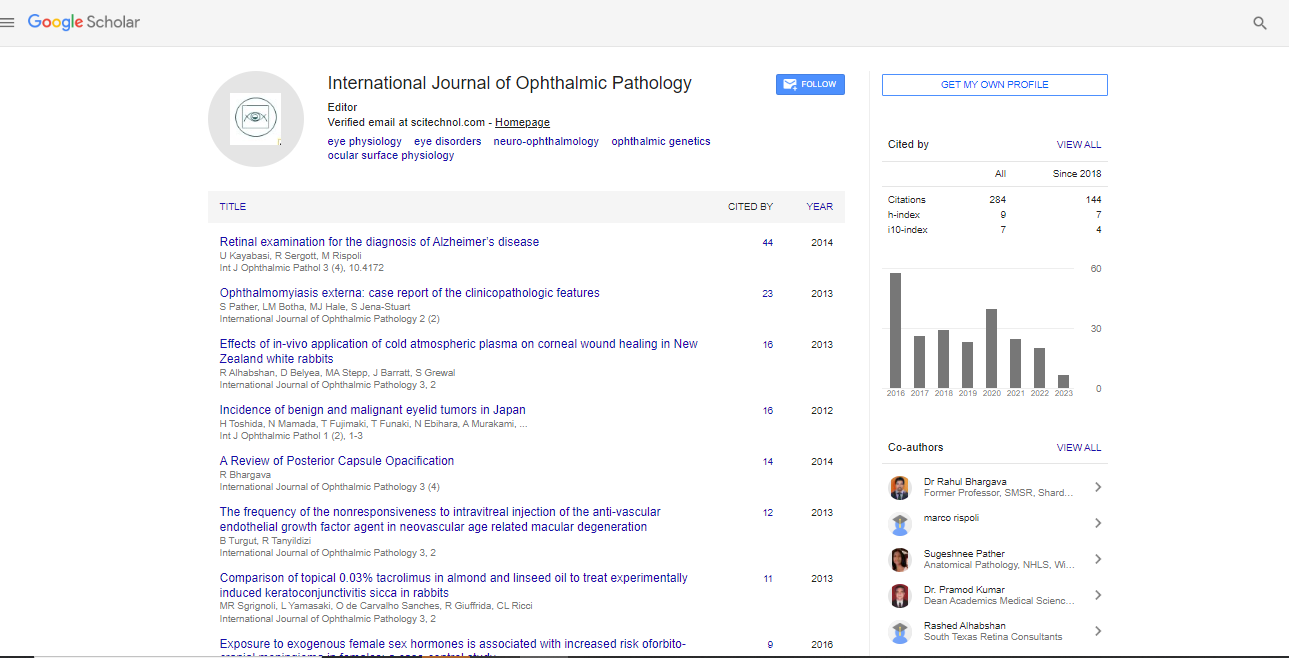Commentary, Int J Ophthalmic Vol: 9 Issue: 6
Age-Related Macular Degeneration
Akhila Sabbineni*
Department of Microbiology, Andhra University, Vishakhapatnam, India
*Corresponding Author:
Akhila Sabbineni
Department of Microbiology
Andhra University, Vishakhapatnam, India
E-mail: akhilasabbineni777@gmail.com
Received: December 07, 2020 Accepted: December 21, 2020 Published: December 28, 2020
Citation: Sabbineni A (2020) Age-Related Macular Degeneration. Int J Ophthalmic Pathol 9:6. (255)
Abstract
Age-related macular degeneration (AMD) is an eye disease that may get worse over time. It’s the leading cause of severe, permanent vision loss in people over age 60. It happens when the small central portion of your retina, called the macula, wears down. The retina is the light-sensing nerve tissue at the back of your eye. Because the disease happens as you get older, it’s often called age-related macular degeneration. It usually doesn’t cause blindness but might cause severe vision problems. Another form of macular degeneration, called Stargardt disease or juvenile macular degeneration, affects children and young adults.
Keywords: Macular Degeneration
Introduction
Age-related macular degeneration (AMD) is an eye disease that may get worse over time. It’s the leading cause of severe, permanent vision loss in people over age 60.
It happens when the small central portion of your retina, called the macula, wears down. The retina is the light-sensing nerve tissue at the back of your eye.
Because the disease happens as you get older, it’s often called age-related macular degeneration. It usually doesn’t cause blindness but might cause severe vision problems.
Another form of macular degeneration, called Stargardt disease or juvenile macular degeneration, affects children and young adults.
Types of age-related macular degeneration
Dry form: individuals with this could have yellow deposits, referred to as druses, in their macula. many little druses might not cause changes in your vision. However, as they get larger and additional varied, they could dim or distort your vision, particularly once you scan. because the condition gets worse, the photosensitive cells in your macula get dilatants and eventually die. within the symptom type, you'll have blind spots within the center of your vision. As that gets worse, you may lose visual modality.
Wet form: Blood vessels grow from beneath your macula. These blood vessels leak blood and fluid into your tissue layer. Your vision is distorted in order that straight lines look wavy. you'll even have blind spots and loss of visual modality. These blood vessels and their injury eventually type a scar, resulting in permanent loss of visual modality.
Most people with degeneration have the dry type, however the dry type will cause the wet type. solely concerning 100% of individuals with degeneration get the wet type.
Symptoms of degeneration
Early on, you may not have any noticeable signs of degeneration. it would not be diagnosed till it gets worse or affects each eyes.
• Worse or less clear vision. Your vision may be fuzzy, and it should be laborious to scan fine print or drive.
• Dark, fuzzy areas within the center of your vision
• Rarely, worse or completely different color perception
Causes of degeneration
Age-related degeneration is additional common in older individuals. It’s the leading reason behind severe vision loss in adults over sixty.
Macular degeneration could have one thing to try to together with your genes. If somebody in your family has it, your risk may be higher.
Smoking, having high force per unit area or high cholesterol, obesity, intake voluminous saturated fat, being white, being feminine, and having a lightweight eye color are risk factors.
 Spanish
Spanish  Chinese
Chinese  Russian
Russian  German
German  French
French  Japanese
Japanese  Portuguese
Portuguese  Hindi
Hindi 